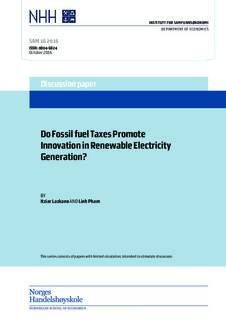| dc.contributor.author | Lazkano, Itziar | |
| dc.contributor.author | Pham, Linh | |
| dc.date.accessioned | 2016-11-29T14:27:43Z | |
| dc.date.available | 2016-11-29T14:27:43Z | |
| dc.date.issued | 2016-11-29 | |
| dc.identifier.issn | 0804-6824 | |
| dc.identifier.uri | http://hdl.handle.net/11250/2423519 | |
| dc.description.abstract | We evaluate the role of a fossil fuel tax and research subsidy in directing innovation
from fossil fuel toward renewable energy technologies in the electricity sector.
Using a global firm-level electricity patent database from 1978 to 2011, we find that
the impact of fossil fuel taxes on renewable energy innovation varies with the type of
fossil fuel. Specifically, a tax on coal reduces innovation in both fossil fuel and renewable
energy technologies while a tax on natural gas has no statistically significant
impact on renewable energy innovation. The reason is that easily dispatchable energy
sources like coal-fired power plants need to complement renewable energy technologies in the grid because renewables generate electricity intermittently. Our results suggest that a tax on natural gas, combined with research subsidies for renewable energy, may effectively shift innovation in the electricity sector towards renewable energy. In contrast, coal taxation or a carbon tax that increases coal prices has unintended negative consequences for renewable energy innovation. | nb_NO |
| dc.language.iso | eng | nb_NO |
| dc.relation.ispartofseries | DP SAM;16/2016 | |
| dc.subject | Electricity; Energy taxes; Renewable; coal, natural gas technologies | nb_NO |
| dc.title | Do Fossil fuel Taxes Promote Innovation in Renewable Electricity Generation? | nb_NO |
| dc.type | Working paper | nb_NO |
| dc.subject.nsi | VDP::Social science: 200::Economics: 210 | nb_NO |
| dc.source.pagenumber | 74 | nb_NO |
